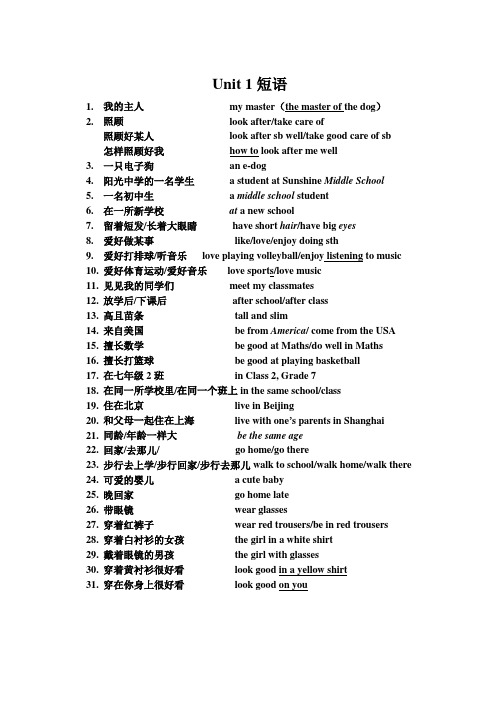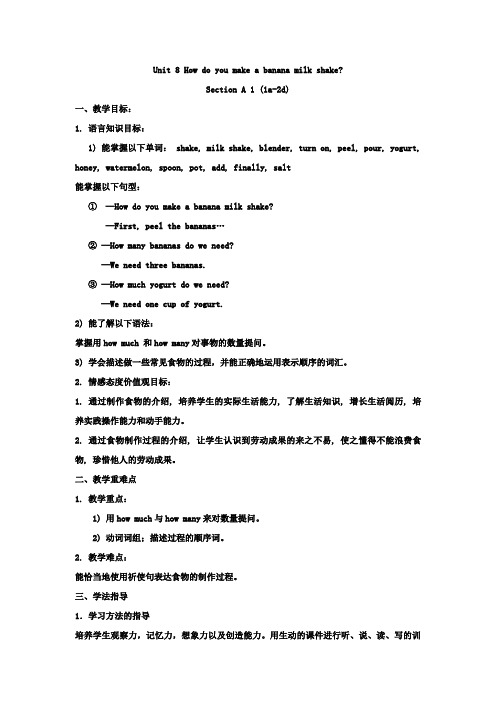初中英语句型转换教学教材
初中英语句型转换课件

Fuqing Longtian Junior Middle School
Fuqing Longtian Junior Middle School
句型转换是句子类别的
转换。该题的目的在于检测学 生运用各种句型的表达能力。 要求学生对所学的句子结构和 词形的变化做到概念清楚,运 用准确。
书山有路勤为径 学海无涯苦作舟
[例1] The little girl was so tired that she couldn’t go farther.
The little girl was ______ tired ______ go farther.
通过分析,我们不难发现,该题是由复合 句转换为简单句,可用too…to句型。
Fuqing Longtian Junior Middle School
Fuqing Longtian Junior Middle School
[例4] They were tired, so they had a rest. They had a rest ______ they were tired.
书山有路勤为径 学海无涯苦作舟
Fuqing Longtian Junior Middle School
Fuqing Longtian Junior Middle School
(2) 对划线部分提问
Fuqing Longtian Junior Middle School
对划线部分提问是根据划线的内容提出一个特 殊疑问句。即特殊疑问词+一般疑问句构成。
a. 如划线部分是定语,它所修饰的词要 跟随特殊疑问词移至句前。
[例1] This is Kate’s hat. _W__h_o_se_ __h_a_t__ is this?
初中英语句型转换技巧精编版

14
www.art-com.co.kr
反意疑问句的转换
Company Logo
反意疑问句
结构:“陈述句+简短问句”,
规律:“前面肯定;后面否定”和“前面否定; 后面肯 定”的规律和简短问句的主语必须 用代词的要求。
Tom likes playing football,doesn't he?
Xiao Hong didn't like singing,did she?
Copyright © by ARTCOM PT All rights reserved.
www.art-com.co.kr
Company Logo
4.It’s going to be cloudy tomorrow
How is it going to be tomorrow? What is it going to be like tomorrow? 5.The students are planting trees on the hills .
www.art-com.co.kr
1.肯定句、否定句和一般疑问句的转换
Company Logo
(1)含有be动词(am,is,are,was,were)、行为动词(do,doe s,did )和情态动词(can,could,should,will,would,may,might) 及含有have/has+p.p的句子;
He can cook Chinese food.
He can’t cook Chinese food.
They have learned all the subjects. They haven’t learned all the subjects.
牛津英语七年级上册Unit 1短语及句型转换

Unit 1短语1.我的主人my master(the master of the dog)2.照顾look after/take care of照顾好某人look after sb well/take good care of sb怎样照顾好我how to look after me well3.一只电子狗an e-dog4.阳光中学的一名学生 a student at Sunshine Middle School5.一名初中生 a middle school student6.在一所新学校at a new school7.留着短发/长着大眼睛have short hair/have big eyes8.爱好做某事like/love/enjoy doing sth9.爱好打排球/听音乐love playing volleyball/enjoy listening to music10.爱好体育运动/爱好音乐love sports/love music11.见见我的同学们meet my classmates12.放学后/下课后after school/after class13.高且苗条tall and slim14.来自美国be from America/ come from the USA15.擅长数学be good at Maths/do well in Maths16.擅长打篮球be good at playing basketball17.在七年级2班in Class 2, Grade 718.在同一所学校里/在同一个班上in the same school/class19.住在北京live in Beijing20.和父母一起住在上海live with one’s parents in Shanghai21.同龄/年龄一样大be the same age22.回家/去那儿/ go home/go there23.步行去上学/步行回家/步行去那儿walk to school/walk home/walk there24.可爱的婴儿 a cute baby25.晚回家go home late26.带眼镜wear glasses27.穿着红裤子wear red trousers/be in red trousers28.穿着白衬衫的女孩the girl in a white shirt29.戴着眼镜的男孩the girl with glasses30.穿着黄衬衫很好看look good in a yellow shirt31.穿在你身上很好看look good on youUnit 1 重点句型1.My name is Millie.=I’m Millie. 我叫米莉。
新人教版新目标七年级英语上册《U...

1 Unit5 Do you have a soccer ball?Period One (1a-1c)一.教材分析:通过uint4单元询问物品在哪的学习,过渡到本单元谈论物品的所属关系。
而本单元的核心语言项目是talk about ownership, 展开学习;以及围绕make suggestions 展开能力训练。
展开能力训练。
主要话题是主要话题是spending time with friends ,培养同学间团结、友爱的精神。
学会使用have 对物品的所属进行提问及回答,以掌握行为动词在一般现在时中的构成和使用;同时引导学生使用所学的句型谈论自己在球类运动中的喜好运动中的喜好,,以及谈论自己对某项运动的感受等。
本部分1a 中的主题图呈现了房间的情景,自然的将学生带入语言交流的自然环境中,引入了房间内常见物品的话题词汇和主要句型。
1a-1c 通过图文及听力练习导入整个单元的话题,是整个Section A 的基础.二.学情分析:本单元的主题是使用have 对物品的所属进行提问及回答,以掌握行为动词在一般现在时中的构成和使用;同时引导学生使用所学的句型谈论自己在球类运动中的喜好。
行为动词在一般现在时的肯定句、否定句和一般疑问句中的构成和使用是初中英语教学中非常重要的内容,七年级的学生经过小学的学习之后,已经具备了一定的英语语言功底,在思维能力方面有较强的记忆力和模仿力,但知识的扩展和运用能力有待于进一步提高,在认知心理方面,学生有较强的求知欲和表现欲。
并初步具备了合作探究能力。
三. Teaching Aims:1. Language goals:Key vocabulary: tennis, soccer, ball, volleyball, basketball, ping-pong2. Target language:----Do you have…? Do you have…?----Yes, I do. /No, I don’t.Yes, I do. /No, I don’t. 3. Ability goalsAsk and answer questions about the ownership.Train the students’ communicative competence and listening skill.4. Moral goalsDo sports every day and keep healthy.四.Teaching important points: 1. The words about ball.2. The target language.----Do you have…? Do you have…? ----Yes, I do. /No, I don’t.Yes, I do. /No, I don’t. ----Does she/he have…? Does she/he have…?----Yes, she/he does./No, she/ he doesn’t.Yes, she/he does./No, she/ he doesn’t. 五.Teaching difficult points:1. Have 与has 的使用的使用2. Do 与does 开头的一般疑问句开头的一般疑问句六.教法与学法:看图认读读单词法,模仿跟读、情境交际,合作交流等方法让学生掌握一些生活学习用品。
人教版初中英语七年级上册期末复习英语句型转换专练

人教版初中英语七年级上册期末复习英语句型转换专练1。
My name is Jim Green (对划线部分提问)_________ _________ ____________?2. Her name is Lucy Green (对划线部分提问)___________ ____________ _______________?3. I am Lucy。
(同义句)________ ________ ________ _________.4.Is your name Gina?(作肯定回答)。
Yes,______ _______ .5.That's my ruler.(作否定句)______ ______ my ruler.6.Call John.His telephone number is 139—4045.(改为一个句子) _______________________________ 。
7.His English name is Mike.(对画线部分提问)______ _______ English name?8.It’s a hat.(对画线部分提问)_______ _______ ?9.This is my friend. (改为一般疑问句)_____ _____ your friend?10.—Is she your cousin?(作否定回答)No,______ ______.11.Those are my brothers。
(改为单数句)______ ______ my _______.12.Emma is her sister. (同义句改写)Emma ______ she _____ ______。
13.This is a backpack. (把a换成two改写句子)________ _______ two ______.把下面所给的单词连成一个结构完整的句子,标点已给出。
初中英语句型转换讲解及练习

句型转换讲解及训练肯定陈述句变否定陈述句步骤:一看情系助二变 第一人称I ,we 变第二人称you my---yoursome-----any something---anything already----yet :并列连词and--or too----either eg: Judy can write stories.________________________________________________ He reads Chinese pomes every morning.________________________________________________ His friend has already mailed the photos._________________________________________________ 陈述句变一般疑问句 ;步骤:一看情系助二变eg :My mother has lunch in the factory._____________________________________________________ {She did very well in her English exam._____________________________________________________ Mary often watches TV at home in the evening._____________________________________________________ There is some milk in the bottle._____________________________________________________*陈述句变选择疑问句的方法:首先将句子变成一般疑问句,然后用or 连接被选择的部分。
初中英语_初中英语八年级上unit 8 (1a教学设计学情分析教材分析课后反思

Unit 8 How do you make a banana milk shake?Section A 1 (1a-2d)一、教学目标:1. 语言知识目标:1) 能掌握以下单词: shake, milk shake, blender, turn on, peel, pour, yogurt, honey, watermelon, spoon, pot, add, finally, salt能掌握以下句型:①─How do you make a banana milk shake?─First, peel the bananas…②─How many bananas do we need?─We need three bananas.③─How much yogurt do we need?─We need one cup of yogurt.2) 能了解以下语法:掌握用how much 和how many对事物的数量提问。
3) 学会描述做一些常见食物的过程,并能正确地运用表示顺序的词汇。
2. 情感态度价值观目标:1. 通过制作食物的介绍, 培养学生的实际生活能力, 了解生活知识, 增长生活阅历, 培养实践操作能力和动手能力。
2. 通过食物制作过程的介绍, 让学生认识到劳动成果的来之不易, 使之懂得不能浪费食物, 珍惜他人的劳动成果。
二、教学重难点1. 教学重点:1) 用how much与how many来对数量提问。
2) 动词词组;描述过程的顺序词。
2. 教学难点:能恰当地使用祈使句表达食物的制作过程。
三、学法指导1.学习方法的指导培养学生观察力,记忆力,想象力以及创造能力。
用生动的课件进行听、说、读、写的训练。
2.学习能力的培养通过连贯的听、说、读、写、表演等技能,培养学生的交际能力,发展他们的思维能力。
3.学习策略的指导在课堂教学中把学生分成两人或四人小组的学习小组,让他们围绕着课堂任务相互交流、相互合作,从而获得知识、技能和情感体验,发展学生的自主学习能力。
初中句型转换教案模板

教案标题:初中句型转换教学一、教学背景1. 课程标准要求:根据《义务教育英语课程标准(2011年版)》,初中阶段学生需掌握基本的句型转换技巧,提高英语表达能力。
2. 学生情况分析:初中生已具备一定的英语基础,但对句型转换的掌握程度参差不齐,需要通过有针对性的教学提高他们的句型转换能力。
3. 教学内容:本节课将围绕常见的句型转换技巧展开,如:主动语态与被动语态的转换、陈述句与疑问句的转换等。
二、教学目标1. 知识目标:让学生掌握几种常见的句型转换技巧,并能运用到实际语境中。
2. 能力目标:通过练习,提高学生的句型转换能力,增强英语表达能力。
3. 情感目标:激发学生学习英语的兴趣,培养他们积极向上的学习态度。
三、教学重点与难点1. 教学重点:句型转换技巧的运用。
2. 教学难点:句子结构的变化和语义的转换。
四、教学过程1. 导入:通过图片或情景引入本节课的主题,激发学生的学习兴趣。
2. 知识讲解:讲解几种常见的句型转换技巧,如主动语态与被动语态的转换、陈述句与疑问句的转换等。
3. 实例分析:给出实例,让学生观察并分析句子在转换过程中的变化及意义。
4. 课堂练习:设计练习题,让学生运用所学句型转换技巧进行实践。
5. 小组讨论:学生分组讨论,分享彼此的解题心得,互相学习。
6. 总结与反馈:对本节课的内容进行总结,并对学生的学习情况进行反馈。
7. 拓展延伸:布置课后作业,让学生进一步巩固所学知识。
五、教学评价1. 课堂参与度:观察学生在课堂上的积极性、主动性。
2. 练习完成情况:评估学生在练习中的表现,检验他们对句型转换技巧的掌握程度。
3. 课后作业:通过学生完成的课后作业,了解他们对课堂所学知识的巩固情况。
六、教学反思本节课结束后,教师应认真反思教学效果,针对学生的实际情况调整教学策略,以提高句型转换教学的针对性和有效性。
同时,关注学生的个体差异,激发他们的学习兴趣,培养他们积极向上的学习态度。
- 1、下载文档前请自行甄别文档内容的完整性,平台不提供额外的编辑、内容补充、找答案等附加服务。
- 2、"仅部分预览"的文档,不可在线预览部分如存在完整性等问题,可反馈申请退款(可完整预览的文档不适用该条件!)。
- 3、如文档侵犯您的权益,请联系客服反馈,我们会尽快为您处理(人工客服工作时间:9:00-18:30)。
初中英语句型转换一、 肯定句改的方法——一步法1. 有 be 动词(is are am were was)/情态动词(can,could, will, would, shall, should,must,may)的。
在 be 动词/情态动词后后加 not。
2. 无 be 动词/情态动词,一般现在时在动词前加 don’t 第三人称单数前 doesn't/一般过去式 didn’t。
3 加 doesn't/ did n’t 的句子注意,句子动词要变成原型。
二、 肯定句改一般疑问句的方法——三步法1. 有 be 动词/情态动词:be 动词/情态动词提到句首,其余照抄,(some 改成 any,第一人称变为第二人称 my改成 your , I 改成 you,we 改成 you,our 改成 your )句末用问号。
2. 无 be 动词/情态动词,在句首加 Do/Does/Did,其余照抄,(some 改成 any,第一人称变为第二人称 my 改成 your , I 改成 you,we 改成 you,our 改成 your )句末用问号。
3. 加 Does、did 的句子注意,句子动词要变成原型。
例如 陈述句: They are in the park.He can play the guitar.He likes the dogs.否定句 They are not in the park. He can not play the guitar. He doesn't like the dogs一般疑问句: Are they in the park?Can he play the guitar?Does he like the dogs?把下列句子变成一般疑问句和 否定句1. I am listening to music._______________________________________2 Tom likes listening to music________________________________________3. Sarah can clean the classroom.________________________________________4. I put a book on my head.________________________________________5. There were some flowers in the vase. 6. We play basketball on Sundays. 7 I go to see my parents once a month.________________________________________ __________________________________________________________________8. She needs some masks._________________________________9. They like making the puppet.______________________10.SuHai and Su Yang lived in a new house. ________________________ ____________________特殊疑问词的用法who whom what意思 谁谁什么用法 问人的身份,姓 名等 问人的身份,姓 名等(问宾语) 问人的职业或 事物是什么例句He is LiLieWho is he ?He is my brother. Who is he ?I can ask him the question.Whom can you ask the question?He is a worker. What is he?He has a book. What does he have ?which哪一个 问 一 定 范 围 内 The big box is mine. Which box is yours?特指的人或物 The girl at the door is Ann. Which girl isAnn?whose谁的问所属关系This is her book. Whose book is this ?This book is hers. Whose is this book?what什么颜色 问颜色(表语) My skirt is red. What color is your skirt?colorWhat几点问点时间We play games at five in the afternoon ?timeWhat time do you play games?when什么时候 问时间We play games in the afternoon ?When do you play games?where什么地方 问地点(状语) We play games at home on Sunday ?Where do you play games on Sunday?why为什么 问原因He isn't at school today because he is ill.Why isn't he at school today ?how怎样问健康状况、 He is fine/strong. How is he ?做事的方式等 I go home by bike. How do you gohome?how old 多大几岁 问年龄He is ten. How old is he ?how多少跟复数名词, There are thirty boys in my class.many问数量How many boys are there in your class?how多少跟不可数名词 There is some milk in the bottle.much问数量或价钱 How much milk is there in the bottle?how far 多远问路程It's five kilometers away from here?How far is it from here?how soon 多久问 in+一段时间 He can finish it in half an hour.How soon can he finish it ?how long 多久问一段时间, He has lived here for a year.问物体的长短 How long has he lived here?The desk is one meters long.How long is the desk ?how often 多久问频率(一次)I go to see my parents once a month. How often do you go to see your parents?How 的疑问句辨析 一、how many 和 how much 的区别how many 用来询问可数名词的数量,它的句式是:How many+复数名词+一般疑问句+? how much 用来询问不可数名词的数量,也可询问价格。
二、how long,how often,how soon 的区别 1、how longhow long 有以下两个主要意思:1. 表示多长时间,主要用来对一段时间(如 three days, four weeks 等)提问。
如:A:How long did he stay here? 他在这儿呆了多久?B:About two weeks. 大约两个星期。
2. 表示某东西有多长。
如:A:How long is the river? 这条河有多长? B:About 500 km. 大约 500 千米。
2、how often 指每隔多久,主要用来对频度副词(如:alway,usually,often,sometimes,never 等)或状语(如: once a week, three times a month 等)提问。
如:A:How often does he come here? 他(每隔)多久来一次?B:Once a month. 每月一次。
3、how soon 指再过多久,主要用来对表示将来的一段时间(如:in an hour, in two weeks 等)提问。
如: A:How soon will he be back? 他要多久才回来? B:In an hour. 1 小时以后。
三、how far 表示“多远”对距离的提问,如: A:How far is your home from school? 你家离学校有多远? B:My house is three miles from school. 我家里学校有三英里对画线部分提问,除了要注意选择正确的疑问词外,还要注意语序的运用。
1、 对句子的主语提问,其语序是: 疑问词+谓语+其他成分?(整个句子是陈述句语序)She is their teacher. Who is their teacher?主语 谓语主语 谓语2、对句子主语的定语部分提问,其语序是:疑问词+主语(即定语所修饰的名词)+ 谓语+其他成分?(整个句子是陈述句语序)My book is over there. Whose book is over there ?主语的定语 主语 谓语疑问词 主语 谓语以上两点方法都是:用正确的疑问词代替画线部分,再把句号改为问号,其余部分一般不做改变3.对表语或宾语的定语部分提问,其语序是:疑问词+表语或宾语(画线部分所修饰的名词)+一般疑问句(省略画线部分和它所修饰的名词)I'm looking for my watch.. 宾语的定语 宾语Whose watch are you looking for ? 疑问词 宾语 一般疑问句(省略掉 my watch)4、对表语、宾语或状语提问,其语序是: 疑问词+ 一般疑问句(省略掉画线部分)?He lives in Beijing . 状语5、对谓语和宾语提问,其语序是:Where does he live ? 疑问词 一般疑问句(省略掉画线部分 in Beijing )疑问词(What)+ 一般疑问句(其中谓语动词要用 do 的相对应形式代替, 省略掉宾语)He watches TV in the evening He watched TV yesterday evening. He is watching TV now. He was watching TV at that time?. He is going to watch TV this evening. He has seen the film.What does he do in the evening? What did he do in the evening? What is he doing now? What was he doing at that time? What is he going to do? What has he done ?综合练习: 1. The children have a good time in the park. 否定句:___________________________________ 一般疑问句:___________________________________ 2. There are about nine hundred people at the concert.(音乐会) 否定句:_________________________________ 一般疑问句:________________________________________ 对划线部分提问:____________________________________ 3. There is only one problem. 否定句:__________________________________________ 一般疑问句:________________________________________ 肯定/否定回答:____________________________________ 4. Ann does her homework every evening. 否定句:__________________________________________ 一般疑问句:________________________________________ 对划线部分提问:____________________________________ 5. I read an English book every day. 否定句:__________________________________________ 一般疑问句:________________________________________ 肯定/否定回答:____________________________________ 对划线部分提问:____________________________________ 6. My brother is in the park now. 否定句:__________________________________________ 一般疑问句:________________________________________ 肯定/否定回答:____________________________________ 对划线部分提问:____________________________________ 7. She has some bread for lunch today. 否定句:__________________________________________ 一般疑问句:_________________________________ 肯定/否定回答:____________________________________ 8. They read English every day. 否定句:___________________________________ 一般疑问句:________________________________________ 肯定/否定回答:____________________________________ 对划线部分提问:____________________________________ 句型转换题一: 1. The girl is singing in the classroom.(改为否定句)+ (改为一般疑问句)2. They are looking for bag.(对画线部分提问)3. I am riding my bike now.(同上) 4. There are twelve studens over there.(同上) 5. I can speak English.(改为一般疑问句) 6. I am writing now.(同上) 7. I have a desk and a chair.(用 He 做主语改写句子) 8. She is buying some food in the supermarket.(改为否定句) 9. I am ill. (对画线部分提问) 10. Does she like growing flowers? (给予否定回答) 11. I will make model planes with my classmates on Sunday. (对画线部分提问) 12. The girl dances beautifully.(改为感叹句) 13. The waiter and the waitress play table tennis every day.( 改为否定句) 14. The boy is standing on the man's shoulders.(改为一般疑问句) 15. It's ten o'clock.(对画线部分提问) 句型转换题二: 1.He does well in Maths. (改为否定句)2.Mike runs as fast as Ben. (改为一般疑问 句) 3.I get up at six thirty every day. (变否定) 4.Jim is good at English and Maths. (对画线部分提问)5. Ben runs fast. I run faster. (两句合并为一句)6. The policeman catches the thief. (改为一般疑问句,作否定回答)7. He is thirty kilos. (对画线部分提 问) 8. Turn right at the third crossing. (改为否定 句)9. How can I get to the shopping centre? (改为同义句)10 The computer is very nice. (改为感叹句)11.Are they American cars? (改为单 数)12.Don’t go along this street. (改为肯定句) 15. I get to the shopping centre by bus. (对画线部分提问) 16. It always rains in summer there. (改为一般疑问句,作肯定回答) 17. It’s cold in winter there. (对画线部分提问) 18. I like autumn best. (改为否定句) 19. Do you like spring? (加上 winter 改为选择疑问句) 20. Su Yang is asking Ben some questions. (对画线部分提问) 21. Please turn off the light. (改为否定句) 22. I know his telephone number. (改为一般疑问句) 23. It is a fine day today. (改为感叹句) 24. The children have school today. (改为否定句) 25. I’d like to join them.(改为一般疑问句)26. They are going to see a film tomorrow. (对画线部分提问) 27. I like collecting stamps and singing. (改为否定句) 28. He often cleans his bedroom. (改为一般疑问句) 29. Liu Tao is watering flowers in the garden. (对画线部分提问) 30. David and Mike are going to planting trees this afternoon. (对画线部分提问) 31. He does his homework in the classroom. (改为否定句) 32. Wang Bing is heavier than Gao Shan. (对画线部分提问) 33. Tom jumps as far as Mike. (改为否定句) 34. I see a man behind me. (改一般疑问句) 35. Helen is good at singing. (改一般疑问句) 36. The boy can jump higher than the girl. (改为否定句) 37. It is hot in summer in New York. (对画线部分提问) 38. Liu Tao needs some pencils. (改为否定句) 39. She is an English girl. (变为复数) 40. They are our women doctors. (变为单数) 41. Mary can fly. (变为一般疑问句,并作否定回答) 42. I like playing football. (改成第三人称单数 he) 43. He has a brother. (改为一般疑问句) 44. Nancy draws some pictures every day. (改为否定句) 45. Liu Tao usually reads newspaper. (改为否定句)。
